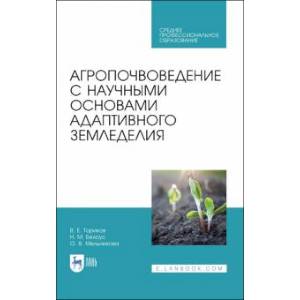Agricultural management with the scientific foundations of adaptive agriculture. Tutorial
Please sign in so that we can notify you about a reply
The training manual outlines the issues of the soil-forming process and the significance of soil formation factors, the structure of the profiles of profiles of various soil genesis, the granulometric and chemical composition of different soil types, general physical and physical-mechanical properties, water regime, the main indicators and models of soil fertility are considered.
In certain chapters of the training manual, adaptive agricultural systems are considered, agrogiological classification, characteristics of the main representatives of weed vegetation, and features of their growth and development are given. Complex measures to combat weeds are given, as well as methods for accounting for cropping crops.
The agricultural and organizational and economic significance of crop rotation, classification and the principles of their construction have been considered.
The techniques of the minimum and zero soil processing system are given, the technology of zero processing of the NOU-TILL and the alternative to the soil of the strip -illa soil, as well as the agrotechnical foundations for the protection of soils from erosion, are described.
The modern scientifically substantiated techniques of the main, pre -sowing and post -group soil processing depending on the cultivated crops in field cropes are described. The main technological operations to cultivate field crops in various regions of Russia are examined in detail. Attention was paid to the significance of the experimental business in intensive agriculture and research methods in agronomy.
The textbook “Agricultural Science with the scientific foundations of adaptive agriculture” is intended for students mastering educational programs of the Agronomy SPO and teachers of agricultural colleges and technical schools
In certain chapters of the training manual, adaptive agricultural systems are considered, agrogiological classification, characteristics of the main representatives of weed vegetation, and features of their growth and development are given. Complex measures to combat weeds are given, as well as methods for accounting for cropping crops.
The agricultural and organizational and economic significance of crop rotation, classification and the principles of their construction have been considered.
The techniques of the minimum and zero soil processing system are given, the technology of zero processing of the NOU-TILL and the alternative to the soil of the strip -illa soil, as well as the agrotechnical foundations for the protection of soils from erosion, are described.
The modern scientifically substantiated techniques of the main, pre -sowing and post -group soil processing depending on the cultivated crops in field cropes are described. The main technological operations to cultivate field crops in various regions of Russia are examined in detail. Attention was paid to the significance of the experimental business in intensive agriculture and research methods in agronomy.
The textbook “Agricultural Science with the scientific foundations of adaptive agriculture” is intended for students mastering educational programs of the Agronomy SPO and teachers of agricultural colleges and technical schools
Author:
Author:Olga Vladimirovna Melnikova, Belous Nikolai Maksimovich, Torikov Vladimir Efimovich
Cover:
Cover:Hard
Category:
- Category:Engineering & Transportation
- Category:Reference books
Publication language:
Publication Language:Russian
Paper:
Paper:offset
Series:
Series: secondary vocational education
Age restrictions:
Age restrictions:16+
ISBN:
ISBN:978-5-8114-8291-7
No reviews found
